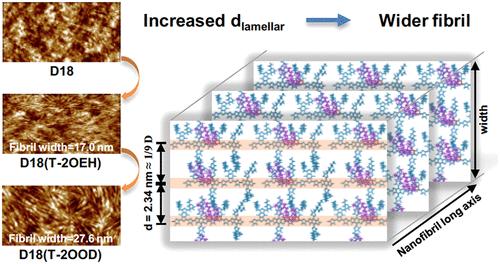Tuning of the Polymeric Nanofibril Geometry via Side-Chain Interaction toward 20.1% Efficiency of Organic Solar Cells
IF 14.4
1区 化学
Q1 CHEMISTRY, MULTIDISCIPLINARY
引用次数: 0
Abstract
Constructing fibril morphology has been believed to be an effective method of achieving efficient exciton dissociation and charge transport in organic solar cells (OSCs). Despite emerging endeavors on the fibrillization of organic semiconductors via chemical structural design or physical manipulation, tuning of the fibril geometry, i.e., width and length, for tailored optoelectronic properties remains to be studied in depth. In this work, a series of alkoxythiophene additives featuring varied alkyl side chains connected to thiophene are designed to modulate the growth of fibril aggregates in cutting-edge polymer donors PM6 and D18. Molecular dynamics simulations and morphological characterizations reveal that these additives preferentially locate near and entangle with the side chains of polymer donors, which enhance the conjugated backbone stacking of polymer donors to form nanofibrils with the width expanding from 12.6 to 21.8 nm and the length increasing from 98.3 to 232.7 nm. This nanofibril structure is feasible to acquire efficient exciton dissociation and charge transport simultaneously. By integrating the fibril PM6 and L8-BO as the donor and acceptor layers in pseudo-bulk heterojunction (p-BHJ) OSCs via layer-by-layer deposition, an improvement of power conversion efficiency (PCE) from 18.7% to 19.8% is observed, contributed by enhanced light absorption, charge transport, and reduced charge recombination. The versatility of these additives is also verified in D18:L8-BO OSCs, with enhanced PCE from 19.3% to 20.1%, which is among the highest values reported for OSCs.

求助全文
约1分钟内获得全文
求助全文
来源期刊
CiteScore
24.40
自引率
6.00%
发文量
2398
审稿时长
1.6 months
期刊介绍:
The flagship journal of the American Chemical Society, known as the Journal of the American Chemical Society (JACS), has been a prestigious publication since its establishment in 1879. It holds a preeminent position in the field of chemistry and related interdisciplinary sciences. JACS is committed to disseminating cutting-edge research papers, covering a wide range of topics, and encompasses approximately 19,000 pages of Articles, Communications, and Perspectives annually. With a weekly publication frequency, JACS plays a vital role in advancing the field of chemistry by providing essential research.

 求助内容:
求助内容: 应助结果提醒方式:
应助结果提醒方式:


